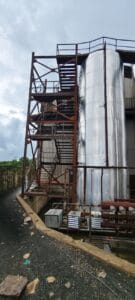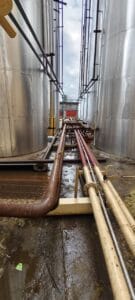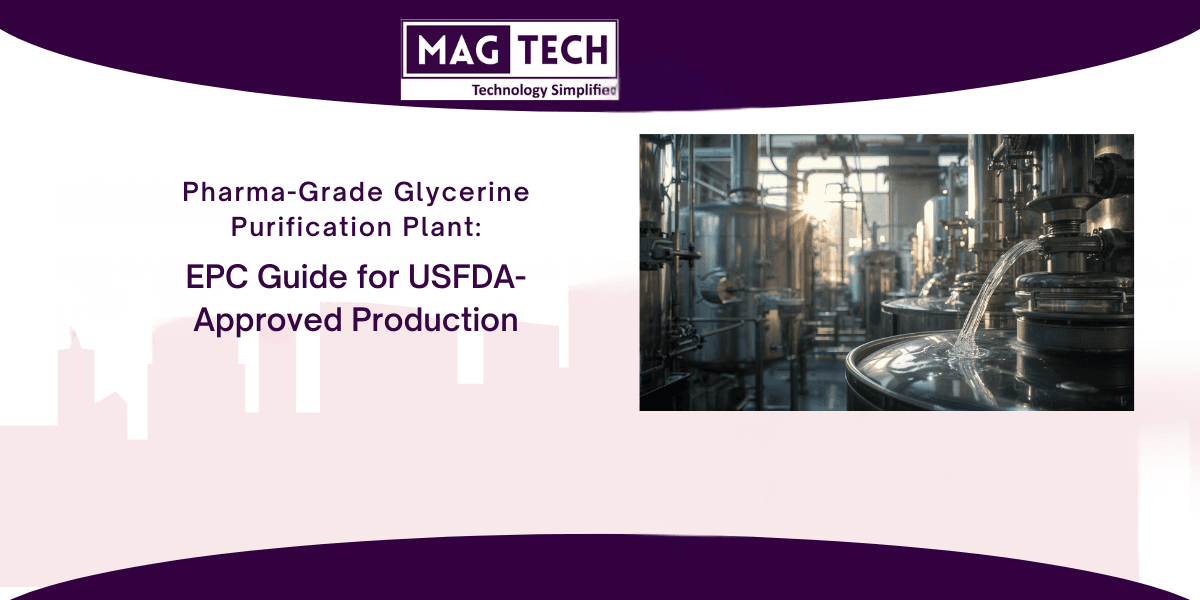Choosing the right biodiesel plant manufacturer is one of the most important decisions you will make in your renewable energy journey. The plant you install will define your production quality, operational costs, compliance readiness, and even your ability to scale in the future. An experienced biodiesel plant manufacturer is the right partner who can assist you in scouting technology, regulatory requirements, safety protocols, and financial planning.
This checklist is designed to guide entrepreneurs, investors, and project managers through the key factors that matter before signing a contract. From technical capabilities and feedstock compatibility to after-sales service and sustainability features, every point here can impact your plant’s long-term success.
Let’s go deep and understand how you should proceed to fulfill your biodiesel plan.


Table of Contents
ToggleUnderstanding Your Project Scope
Before approaching manufacturers, you need to have a clear understanding of your project requirements. This clarity will help you filter out unsuitable options early and ensure that the proposals you receive are realistic and relevant.
Production Capacity
The first step is to define your production capacity. Are you planning a small plant producing up to 5,000 litres a day, a mid-size setup of 5,000–50,000 litres, or a large-scale facility above 50,000 litres? The answer will influence everything, from plant size and equipment choice to licensing requirements and investment needs.
Feedstock Strategy
Next, determine your feedstock strategy. Will you use used cooking oil, animal fats, palm oil, or a mix? Your manufacturer must have technology compatible with your chosen feedstock and the flexibility to switch if market prices or supply chains change.
Product goals
Finally, decide on your product goals, whether you will focus solely on biodiesel or also process by-products like glycerin for extra revenue. This upfront clarity will make your manufacturer search faster and more targeted.
Once these primary goals are determined, you need to focus on the technical capabilities and technological parameters.
Technical Capability and Technology Offered: A Quick Peek
When evaluating a biodiesel plant manufacturer, their technical expertise and the technology they offer should be at the top of your checklist. The right technology not only ensures consistent fuel quality but also helps you stay competitive as industry standards evolve. Key aspects to assess include:
- Type of Technology Used
- Look for proven methods such as base-catalysed transesterification, enzymatic processes, or supercritical methods.
- The process should align with your feedstock type and desired biodiesel quality (meeting ASTM D6751 or EN 14214 standards).
- Process Efficiency
- Evaluate conversion rates, energy consumption, and overall yield.
- A higher yield means more biodiesel per litre of feedstock, reducing production costs.
- Scalability and Modularity
- Check if the plant design can be expanded in the future without a full rebuild.
- Modular systems allow you to add capacity as demand grows.
- Automation and Control Systems
- Multi-Feedstock Flexibility
- The ability to process various feedstocks is crucial for long-term viability, particularly when market conditions fluctuate.
Choosing a biodiesel plant manufacturer with strong technical capability ensures that your plant will not only meet today’s needs but will also adapt to tomorrow’s opportunities.
Once the technical aspects are considered, shift your focus to seeking regulatory compliance and licensing requirements.
Regulatory Compliance Support and Licensing
Setting up a biodiesel plant in India requires navigating multiple legal and regulatory approvals. A capable manufacturer should provide guidance—or at least connect you with reliable consultants to make this process smooth. When assessing their support, look for:
- Familiarity with Local and State Regulations
- Manufacturers with prior projects in your state are more likely to understand the specific Pollution Control Board requirements and timelines.
- Assistance with Statutory Clearances
- Consent to Establish (CTE) and Consent to Operate (CTO) from the State Pollution Control Board.
- Factory License for plant operations.
- Explosive License (PESO) if methanol or other hazardous chemicals are stored.
- Environmental Compliance
- Support in meeting air and water pollution norms.
- Guidance on effluent treatment and safe disposal of solid waste.
- Documentation and Application Process
- Help with preparing technical drawings, process flow diagrams, and safety protocols for submission to authorities.
- Local Government NOCs
- Assistance in obtaining municipal or panchayat approvals, fire department clearance, and power supply sanction.
A manufacturer who understands regulatory frameworks can save you months of delays and prevent costly compliance violations later. This support is a significant factor in your decision-making.
The next section covers the safety and environmental implications of a biodiesel plant.
Safety Systems and Environmental Responsibility
Safety and environmental protection are not optional—they are core to a biodiesel plant’s design. The manufacturer you choose must have a proven track record of integrating robust safety features and eco-friendly systems into their plants. Key points to evaluate include:
1. Built-in Safety Systems
- Emergency Shutdown Mechanisms – Automated systems that halt operations in case of fire, chemical leakage, or equipment failure.
- Explosion Protection – Pressure relief valves, flame arrestors, and explosion-proof electrical fittings where required.
- PPE and Safety Signage – Clear protocols for protective gear and hazard communication throughout the facility.
2. Fire Safety Infrastructure
- Fire hydrants, extinguishers, and suppression systems are installed as per statutory norms.
- The manufacturer’s ability to design layouts that ensure easy evacuation and emergency access.
3. Chemical Handling Safety
- Safe storage systems for methanol, caustic soda, and other hazardous chemicals.
- Spill containment areas and neutralization systems to manage accidental leaks.
4. Environmental Responsibility Measures
- Effluent Treatment Systems (ETP) – For treating wastewater before discharge.
- Emission Control Systems – To limit particulate and gaseous emissions.
- Secondary Containment – Preventing ground or water contamination from chemical storage.
5. Compliance with Safety Standards
- Manufacturer’s adherence to OSHA, PESO, and State Pollution Control Board guidelines.
- Documentation and training for your staff on safe operations.
A manufacturer committed to safety and environmental responsibility ensures long-term operational stability, regulatory compliance, and protection for both workers and the surrounding ecosystem.
The next step is to consider the financial feasibility of the biodiesel plant setup.
Cost Considerations and Financial Viability
A biodiesel plant is a capital-intensive project, and understanding the full cost picture before choosing a manufacturer is essential. The right partner will be transparent about both setup and operational costs, helping you avoid unpleasant surprises. Key considerations include:
1. Initial Capital Investment
- Small-Scale Plants (≤5,000 L/day) – Approx. ₹1 to 1.5 crore.
- Mid-Size Plants (5,000–50,000 L/day) – Approx. ₹2.5 to 8 crore.
- Large-Scale Plants (>50,000 L/day) – Approx. ₹10 to 20 crore.
- Ask for a detailed breakdown: equipment, installation, civil works, safety systems, and automation.
2. Operational Costs
- Feedstock Cost – The largest recurring expense. It can vary significantly by market conditions.
- Utilities – Power, water, and heating costs for the transesterification process.
- Labour and Maintenance – Operator salaries, technician fees, and preventive maintenance schedules.
- By-Product Management – Costs for processing or selling crude glycerin and other residues.
3. Manufacturer’s Financial Support Role
- Some manufacturers can connect you with banks or NBFCs experienced in renewable energy projects.
- Guidance on preparing a Detailed Project Report (DPR) to secure financing.
4. Return on Investment (ROI) Analysis
- Ask for the projected payback period and profit margins based on your feedstock choice and capacity.
- Ensure the manufacturer’s estimates are backed by real project data, not just marketing claims.
A manufacturer who can clearly explain the financial implications and offer tools to optimise them will be a strategic partner, not just an equipment supplier.
The next step is to consider whether a biodiesel plant manufacturer provides post-sales training and support for the smooth running of your unit.
Local Presence, After-Sales Support and Training
A biodiesel plant requires ongoing maintenance, periodic upgrades, and trained staff to run efficiently. A manufacturer’s local presence and support capabilities directly affect your plant’s uptime and productivity. Key factors to check include:
Proximity and Service Reach
- Manufacturers with regional offices or local service teams can respond faster to breakdowns.
- Availability of field engineers for on-site troubleshooting and preventive maintenance.
Installation and Commissioning Support
- Supervision during plant setup to ensure correct assembly and integration.
- Trial runs and performance validation before handover.
Operator and Technician Training
- Structured training programs covering operations, safety, and routine maintenance.
- Availability of refresher courses or updated training when new technology is introduced.
Spare Parts Availability
- Ready stock of critical spares to minimise downtime.
- Supply chain efficiency for importing or manufacturing non-standard parts.
Maintenance Contracts
- Annual Maintenance Contracts (AMCs) with clear service schedules and cost terms.
- Remote monitoring options for early fault detection.
A manufacturer with strong after-sales service and comprehensive training ensures your plant operates smoothly from day one and remains productive for years to come. Let’s see what your biodiesel plant may need in the future years.
Quality Assurance, Certifications and Future-proof Sustainability
When selecting a biodiesel plant manufacturer, quality and long-term adaptability go hand in hand. Look for ISO or industry-specific certifications that demonstrate adherence to global standards, along with clear performance guarantees on output, purity, and uptime.
Equally important is the plant’s ability to process multiple feedstocks and integrate future upgrades such as glycerin purification or biorefinery expansion. A forward-thinking manufacturer will design for scalability, environmental compliance, and evolving market demands, ensuring your investment remains competitive, efficient, and sustainable for decades.
This dual focus protects both your operational reliability and your long-term business growth. All these factors take the right shape when you choose an experienced biodiesel plant manufacturer.
MAGTECH: Your Biodiesel Journey Starts with the Right Partner
Choosing the right biodiesel plant manufacturer is instrumental to successfully executing your plan. You need a turnkey solution provider who understands your vision, supports compliance, ensures safety, and builds for the future. The right choice can mean faster commissioning, lower operating costs, and a plant that grows with your business.
MAGTECH has the expertise, proven technology, and end-to-end support to turn your biodiesel ambitions into reality. Whether you’re starting small or aiming big, our solutions are built for performance and sustainability.
Contact MAGTECH today and let’s power your green energy journey together.


